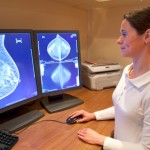 Ah, it wasn t so long ago that it was all so clear: mammograms saved lives, but only if women got them starting around age 40 and had one every year. If you forgot, the mammogram doctor would send you a firm reminder!
Ah, it wasn t so long ago that it was all so clear: mammograms saved lives, but only if women got them starting around age 40 and had one every year. If you forgot, the mammogram doctor would send you a firm reminder!
That was then. In 2009, a federal health panel mandated to advise on such issues parsed the studies and concluded that wait a minute, yearly mammograms for under-50s did more harm than good by detecting way too many benign abnormalities as compared to finding early dangerous lesions in time to prevent progression and breast cancer death.
A new study published in the journal Cancer now adds more fuel to the controversy. The researchers, led by Matthew L. Webb and colleagues from the Massachusetts General Hospital, studied 7,300 women with invasive breast cancer diagnosed during the 1990s and followed through 2007. They documented 609 deaths from breast cancer among these women, and 905 deaths from other causes. Their retrospective analysis of the relationship of screening mammography to prognosis and outcome showed that 71 percent of the fatalities (395) from breast cancer were among women who had not been screened (including women who had been screened, but not within 2 years of the diagnosis). They also learned that the median age at which the fatal breast cancers had been diagnosed was 50: that is, half of the lethal cancers were diagnosed in women younger than 50.
The findings support initiation of mammographic screening before age 50, according to Dr. Blake Cady, speaking for the study s authors. This recommendation was echoed by Clifford Hudis, MD, president of the American Society of Clinical Oncology and Chief of the medical breast cancer service at Memorial Sloan-Kettering Cancer Center in New York, who noted that earlier stage, smaller tumors, and lower nodal involvement are all associated with improved outcomes in breast cancer. Dr. Hudis is also an ACSH scientific advisor.
ACSH s Dr. Gilbert Ross had a somewhat different perspective: While Dr. Hudis' statement is clearly correct no one can argue with the statement that finding breast cancers earlier rather than later is best I find the authors interpretation of this study, and most of the media s take on it, to be off-target and mainly carrying on the drumbeat of Get Screened, Early and Often. The USPSTF evaluation really balanced the pros and cons of that approach, and found it wanting. Remember that most breast cancer deaths are overwhelmingly among older patients, and that the disease has always been more lethal in the older age group, contrary to popular belief. But most importantly, as with all such studies, if the focus is solely on breast cancer outcomes, of course the more screening, the fewer deaths from breast cancer. I ask, why not start screening at age 21, just to be sure of never missing anything? The study leaves unmentioned the unintended consequences of over-screening and over-diagnosis: needless biopsies and surgeries, anxiety, even radiation and chemotherapy for lesions that would never have progressed if left undetected. If the subject is widened from breast cancer deaths to overall benefit vs. risk, I believe the advice from the USPSTF will be found to remain valid.


